|
|
|
Sort Order |
|
|
|
Items / Page
|
|
|
|
|
|
|
| Srl | Item |
| 1 |
ID:
088841
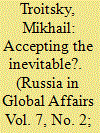

|
|
|
| 2 |
ID:
130242
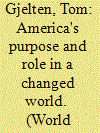

|
|
|
|
|
| Publication |
2014.
|
| Summary/Abstract |
The presidencies of George W. Bush and Barack Obama suggest what doesn't work in efforts to promote US influence in the world. By ordering an ill-conceived invasion of Iraq, Bush alienated US allies. His policies of secretly imprisoning Islamist militants and then subjecting them to "enhanced" interrogation and indefinite detention at Guantánamo struck Muslims everywhere as evidence of a war on Islam. Barack Obama, elected as the most explicitly anti-war president since Woodrow Wilson, came into office determined to undo the international damage done by his predecessor. "The walls between old allies on either side of the Atlantic cannot stand," Obama said in Berlin in 2008, and a year later, speaking in Cairo, he promised "a new beginning" with the Muslim world, with relations "based upon mutual interest and mutual respect." As promised, he withdrew US combat troops from Iraq. By 2013, however, Obama had fared little better than Bush in his global outreach. According to the Pew Research Center, support for the United States in Egypt, Jordan, Lebanon, and Pakistan was actually lower than it had been in the last year of the Bush administration. In Europe, the US favorability rating was higher than it was under Bush, but it had fallen steadily in the years since Obama took office, and it remained far below where it stood in 2000. One possible lesson from these years is that presidential personalities, speeches on foreign stages, and the changing international opinions of US policies matter less than we might think. Perhaps the most reliable measure of America's standing in the world is how appealing the country is to all those who are considering migration. Since 2007, Gallup surveys in more than one hundred and fifty countries have shown that the United States is far and away the number one favored destination. The most recent survey projected that one hundred and thirty-eight million people worldwide would like to move permanently to the United States, more than three times the number who would choose the United Kingdom, the second most favored destination. Those numbers show the United States still represents opportunity and promise to people around the world, and it is clearly in the US global interest to maintain that reputation.
|
|
|
|
|
|
|
|
|
|
|
|
|
|
|
|
| 3 |
ID:
130594
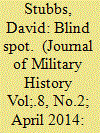

|
|
|
|
|
| Publication |
2014.
|
| Summary/Abstract |
This paper examines why the RAF maintained its view that it would be neither appropriate nor prudent to protect its bombers with long-range fighter escort until the time, late in the day, when the U.S. Army Air Forces' trials to increase the Spitfire fighter's range proved otherwise. The paper argues that some senior RAF officers, who believed that long-range fighters were unnecessary, lacked the conceptual dexterity needed after the RAF's bombers' vulnerability to single-engined fighters became apparent, and that these failings were hidden by a culture of obedience to perceived wisdom that existed within the RAF.
|
|
|
|
|
|
|
|
|
|
|
|
|
|
|
|
| 4 |
ID:
105594
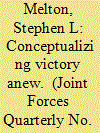

|
|
|
| 5 |
ID:
125193
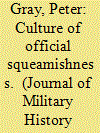

|
|
|
|
|
| Publication |
2013.
|
| Summary/Abstract |
Although it waged the largest and most costly of Britain's Second World War campaigns, RAF Bomber Command was not mentioned in Prime Minister Churchill's 1945 Victory Speech and its Commander-in-Chief, Air Chief Marshal Sir Arthur Harris, was left off the Victory Honours List. The crowning insult to Bomber Command veterans was the lack of a campaign medal for the strategic air offensive. This article uses case studies of the campaign medal saga, still very much alive today, and the perceived reluctance of the wartime Air Ministry to acknowledge the RAF's resort to area bombing to test the argument of some historians that this slight of Bomber Command was due to "official squeamishness" in the Air Ministry and elsewhere in the government in the aftermath of the bombing of Dresden.
|
|
|
|
|
|
|
|
|
|
|
|
|
|
|
|
| 6 |
ID:
130505
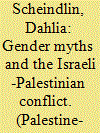

|
|
|
|
|
| Publication |
2011.
|
| Summary/Abstract |
Israeli society has distinct and complex gender roles, and the identities of both men and women are largely derived from militaristic socialization and a wartime mentality. Yet these has not been extensive systemic research comparing the attitudes of men and women toward the Israel-Palestine Conflicts.
|
|
|
|
|
|
|
|
|
|
|
|
|
|
|
|
| 7 |
ID:
130611
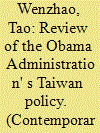

|
|
|
|
|
| Publication |
2014.
|
| Summary/Abstract |
Since May 2008, relations across the Taiwan Strait have experienced a Historical turning point. The two sides of the strait have tided over a "high-risk" period and embarked upon a path of peaceful development and benign interaction. When the Obama administration came to power in January 2009, the new situation in cross-straits relations had already taken hold. By then, the US. was busy coping with a series of challenges both at home and abroad, including tackling the ?nancial crisis and seeking to end the two wars in Iraq and Afghanistan. So, it can be said that the Taiwan issue was neither a priority in Obama's foreign strategy, and that he did not expend as much energy on it as his predecessor.
|
|
|
|
|
|
|
|
|
|
|
|
|
|
|
|
| 8 |
ID:
133375
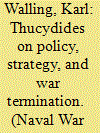

|
|
|
|
|
| Publication |
2014.
|
| Summary/Abstract |
The article discusses the works of Greek historian Thucydides on the topics of government policy during war, military strategy, and peacemaking and the termination of war. The article discusses the Peace of Nicias often associated with the conclusion of the first Peloponnesian War and why Thucydides did not believe that the treaty brought the war to an end. It discusses Thucydides's work "Pentecontaetia," tensions between city-states Athens and Sparta, and the Persian Wars.
|
|
|
|
|
|
|
|
|
|
|
|
|
|
|
|
| 9 |
ID:
085115
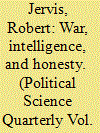

|
|
|
|
|
| Publication |
2008.
|
| Summary/Abstract |
Robert Jervis analyzes what the memoirs of George Tenet and Douglas Feith tell us about themselves and about the Bush administration's war on terror and war in Iraq. He argues that as accounts of failures, they have the difficult task of defending without seeming defensive, and in the end are as important for what they reveal inadvertently as for the information they mean to convey.
|
|
|
|
|
|
|
|
|
|
|
|
|
|
|
|
|
|
|
|
|